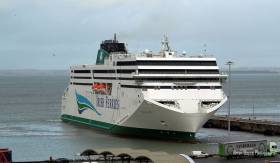Displaying items by tag: Dunkerque, France
W.B. Yeats Completes First Season on Ireland-France With Follow Up Dry-Docking in Dunkerque
W.B. Yeats has completed a first high-season on the year-round operated Dublin-Cherbourg route and the €144m cruiseferry built in 2018 made its inaugural dry-docking in France this morning, writes Jehan Ashmore.
Afloat tracked W.B. Yeats to Dunkerque (East) and taking its place on the direct Ireland-France route sailings is the ropax Epsilon. The 194m long W.B. Yeats was assisted by a pair of tugs, Aventereux and CB Cyclone into a dry-dock at the northern French port.
The considerably larger capacity of W.B. Yeats connecting the Irish capital and mainland continental Europe is a massive boost for Irish Ferries when compared to then Cartour Epsilon which launched the route in 2014. Since then the scenario of 'Brexit' highlights the direct route's strategic trade importance for Irish hauliers (albeit at the expense of Rosslare-France) in avoiding the UK 'land-bridge' via the Port of Dover.
At 54,975 gross tonnage, W.B. Yeats is easily the largest ever custom built ferry ordered by ICG, owners of Irish Ferries, however the completion of the newbuild was much delayed at a German shipyard. The cruiseferry was expected to make a debut during the Spring of last year.
The 1,850 passenger W.B. Yeats which also has a capacity for 1,216 cars and 165 lorries, actually made its maiden commercial sailing firstly on the Dublin-Holyhead in January of this year. Since its introduction the newbuild has received recognition having been awarded prestigious shipping industry awards among them 'Ferry of the Year 2019'.
Welsh duties ended in March, when W.B. Yeats finally entered service on the direct Ireland-France route linking Dublin-Cherbourg over the St. Patrick's Bank Holiday weekend. Recently, the cruiseferry made a brief return on the Irish Sea by sailing to Holyhead in tandem with Ulysses, however a scheduled round trip by W.B. Yeats last Saturday did not take place nor sailings by the Epsilon which was had already taken up duties on the French route.
In not operating the round trip to north Wales, this enabled W.B. Yeats instead make a repositioning coastal run from Dublin Port to Rosslare Europort. The Wexford port became the new ship's first Irish port of call as part of the delivery voyage last year, during December from the FSG shipyard in Flensberg, Germany. W.B. Yeats then however headed first for Holyhead prior to the newbuild's debut at its Irish homeport in Dublin.
Afloat also tracked W.B. Yeats depart Rosslare on Saturday evening as the cruiseferry made a leisurely overnight non commercial sailing to Pembroke Dock. This was to facilitate routine ferry Isle of Inishmore complete a scheduled sailing in advance.
The south Wales port thus became the final ferryport of the Irish Ferries route network not so far visited by W.B. Yeats. The call to the Pembrokeshire port was for the purposes of conducting berthing trials which took place on Sunday morning following the Isle of Inishmore's departure at 06.46hrs.
W.B. Yeats call to the Pembroke Dock Ferry Terminal, operated by the Milford Haven Port Authority was confirmed to Afloat.ie. The MHPA added the trials was with a view to cover future dry docks of the Isle of Inishmore.
























































